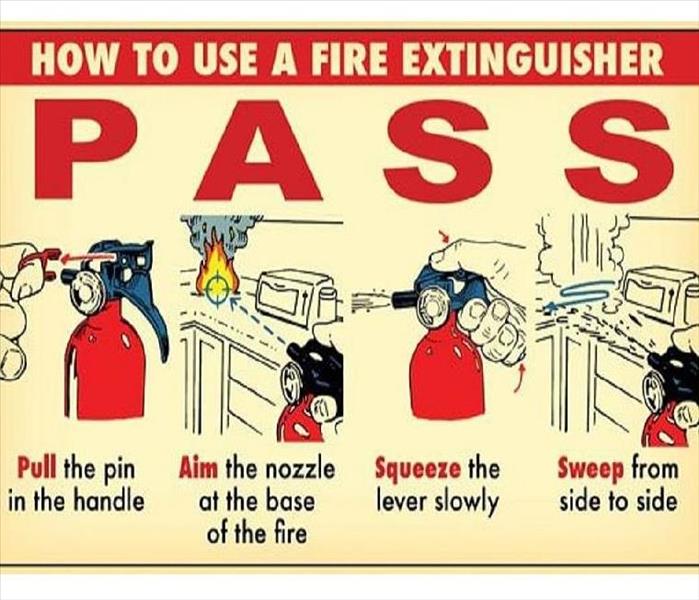How to use a fire extinguisher to protect your Sherman, CT home from damage
4/21/2017 (Permalink)
 According to the U.S. Fire Administration, the best way to remember how to use a fire extinguisher is by remembering the acronym "PASS".
According to the U.S. Fire Administration, the best way to remember how to use a fire extinguisher is by remembering the acronym "PASS".
Most of us have at least one fire extinguisher in our Connecticut homes as well as in our schools and workplace. According to FEMA, the majority of Americans don’t know how to use an extinguisher. This is a dangerous statistic given that fires can double in size every 60 seconds. You don’t want to be frantically reading a manual while the a stovetop fire spreads throughout your kitchen. While operating one is not difficult, there are a few key rules that you should know.
Fire extinguishers are categorized by a variety of classes based on the type of fire they are formulated to extinguish. Most fire extinguishers for homes and public spaces are classified as Class ABC extinguishers, meaning they’re suitable for putting out wood and paper fires, flammable liquid fires, and electrical fires. If you work in a commercial kitchen, your extinguisher is most likely a Class K.
Class A – Ordinary solid combustibles like wood, cloth, and paper products.
Class B – Flammable liquids and gases.
Class C – Electrical fires. (Do not use water to put out this kind of fire – you could get electrocuted!)
Class D – Flammable metals.
Class K – Oils and grease fires. (Never use water on a grease fire – it will cause the flames to explode and spread.)
If you have a fire in your home, a good rule of thumb in determining whether a fire extinguisher will be effective on it is the height of the fire. If the fire is taller than you, your extinguisher most likely will not be able to extinguish the fire and it is recommended that you vacate the premises and dial 9-1-1.
If you are taller than the fire, position yourself in a location where you can make an exit if necessary and confirm that you have the right type of extinguisher for your fire.
According to the U.S. Fire Administration, the best way to remember how to use a fire extinguisher is by remembering the acronym "PASS".
Pull the pin.
Aim the nozzle at the base of the fire. Hitting the tops of the flame with the extinguisher won’t be effective.
Squeeze the trigger. In a controlled manner, squeeze the trigger to release the agent.
Sweep from side to side. Sweep the nozzle from side to side until the fire is put out. Keep aiming at the base while you do so. Most extinguishers will give you about 10-20 seconds of discharge time.
Slowly back away. Even if the fire appears to be extinguished, don’t turn your back on it. There might be unseen hot spots or hidden fires that can ignite into a large flame at any moment.
Once you’ve used a fire extinguisher, even if you didn’t deplete all the pressure, you must get it recharged.
If your Washington, CT home has a fire, SERVPRO of Newtown and Southern Litchfield County has the experience to clean up fire extinguisher residue as well as water and fire damage. Call us at (203) 743-5362





 24/7 Emergency Service
24/7 Emergency Service